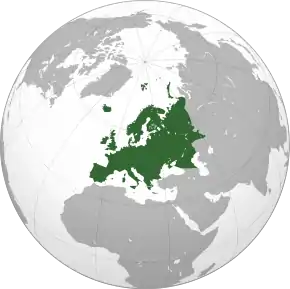Flag of Greenland
The flag of Greenland was designed by Greenland native Thue Christiansen.[2] It features two equal horizontal bands of white (top) and red with a large disk slightly to the hoist side of centre. The top half of the disk is red, the bottom half is white. The top half of the flag bears a slight resemblance to the Flag of Japan as a result. The entire flag measures 18 by 12 parts; each stripe measures 6 parts; the disk is 8 parts in diameter, horizontally offset by 7 parts from the hoist to the centre of the circle, and vertically centered.
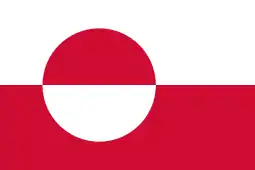 | |
| Names | Erfalasorput ("our flag"), Aappalaartoq ("the red") |
|---|---|
| Use | National flag and civil ensign |
| Proportion | 2:3 |
| Adopted | 1 May 1989[1] |
| Design | A horizontal bicolour of white and red (PMS 186C), with a counterchanged disk slightly off-centre towards the hoist. |
| Designed by | Thue Christiansen |
Its local name in the Greenlandic language is Erfalasorput, which means "our flag". The term Aappalaartoq (meaning "the red") is also used for both the Greenlandic flag and the flag of Denmark (Dannebrog). Today, Greenlanders display both the Erfalasorput and the Dannebrog[3]—often side by side. The flag of Greenland is the only national flag of a Nordic country or territory without a Nordic Cross.
History
Greenland first entertained the idea of a flag of its own in 1973 when five Greenlanders proposed a green, white and blue flag. The following year, a newspaper solicited eleven design proposals (all but one of which was a Nordic cross) and polled the people to determine the most popular.[4] The flag of Denmark was preferred to the others. Little came of this effort.
In 1978, Denmark granted home rule to Greenland, making it an equal member of the Danish Realm. The home rule government held an official call for flag proposals, receiving 555 (of which 293 were submitted by Greenlanders).
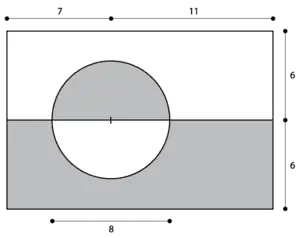
The deciding committee came to no consensus, so more proposals were solicited. Finally the present red-and-white design by Christiansen narrowly won over a green-and-white Nordic cross by a vote of fourteen to eleven.[5] Christiansen's red-and-white flag was officially adopted on 1 May 1989.[2]
To honour the tenth anniversary of the Erfalasorput, the Greenland Post Office issued commemorative postage stamps and a leaflet by the flag's creator.[6] He described the white stripe as representing the glaciers and ice cap, which cover more than 80% of the island; the red stripe, the ocean; the red semicircle, the sun, with its bottom part sunk in the ocean; and the white semicircle, the icebergs and pack ice. The design is also reminiscent of the setting sun half-submerged below the horizon and reflected on the sea.[1] In 1985 it was reported that Greenland's flag had exactly the same motif as the flag of the Danish rowing club HEI Rosport, which was founded before Greenland's flag was chosen. It is not clear whether this is a case of plagiarism or just a coincidence, but the rowing club gave Greenland permission to use their flag.[7]
The colours of the Erfalasorput are the same as those of the Dannebrog, symbolizing Greenland's place in the Danish realm.[8]
 The flag of Denmark, was used before the Greenlandic flag became official.
The flag of Denmark, was used before the Greenlandic flag became official. Current Greenlandic flag.
Current Greenlandic flag.
Other proposals
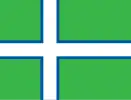
 The first proposal from 1973, suggesting green, white and blue would be appropriate
The first proposal from 1973, suggesting green, white and blue would be appropriate
 The Nordic Cross proposal by Sven Tito Achen in 1984 which was narrowly defeated by the current flag
The Nordic Cross proposal by Sven Tito Achen in 1984 which was narrowly defeated by the current flag
 Anonymous proposal in 1991 (white for the ice of Greenland, green for the name "Greenland")
Anonymous proposal in 1991 (white for the ice of Greenland, green for the name "Greenland")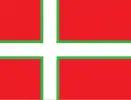
 Another proposal based heavily on the Dannebrog
Another proposal based heavily on the Dannebrog
See also
- Flag of Denmark
- Flag of the Faroe Islands
- List of flags of Denmark
- Raven banner
References
- "Politics in Greenland – Government of Greenland". Archived from the original on 2017-10-15. Retrieved 2014-09-01.
- "Greenland's flag". Nordic Council. Archived from the original on 15 March 2012. Retrieved 8 May 2012.
- "The Greenland flag in the capital Nuk, Greenland | GRID-Arendal". www.grida.no. Retrieved 2018-12-11.
- Sørensen, Axel Kjær (2009). Denmark-Greenland in the Twentieth Century. Museum Tusculanum Press. ISBN 9788763512763.
- "Nu vajer det grønlandske flag over Danmark". Retrieved 2016-06-24.
- "Greenland (Denmark)". flagspot.net. Retrieved 2017-09-01.
- "(Danish) Grønland må gerne bruge roklub-flag". Politiken. Retrieved 15 July 2014.
- "The Greenland Flag". Nordic Co-operation.
External links
| Wikimedia Commons has media related to National flag of Greenland. |
- FOTW: Greenland - History of the Erfalasorput
- Other flag proposals for a Nordic cross design
- http://www.flagscorner.com/greenland-flag/
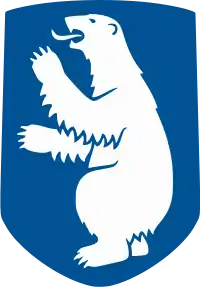
.svg.png.webp)
